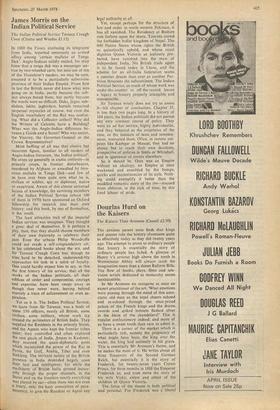James Morris on the Indian Political Service
The Indian Political Service Terence Creagh Coen (Chatto and Windus £3.15) In 1880 the Times, confusing its telegrams from India, reported ominously an armed affray among 'certain mullahs of Tonga Dak'. Anglo-Indians mildly smiled, for they knew that a tonga dak was a messenger ser- vice by two-wheeled carts, but nine out of ten of the Plunderer's readers, we may be sure, assumed it to be a particularly subversive province of their Indian Empire. From first to last the British never did know what was going on in India, partly because the sub- ject always bored them, but partly because the words were so difficult. Daks, jirgas, sub- ahdars, lakhs, jaghirdars, hartals remained perpetual mysteries of course, but even the English vocabulary of the Raj was confus- ing. What did a Collector collect? Why did the Writers of Calcutta have a Building? What was the Anglo-Indian difference be- tween a Guide and a Scout? Who was senior, the Viceroy, the Governor-General or the Crown Representative? . Most baffling of all was that elusive but recurrent figure, familiar to all readers of Anglo-Indian literature, 'the Indian political'. He crops up generally in exotic contexts—in princely coups, in frontier disturbances, murdered by Afghans or assaulted by fero- cious mullahs in Tonga Dak—and few of us have ever been quite sure what he is, civilian or soldier, spy or diplomat, native Or expatriate. Aware of this almost universal lacuna of knowledge, the surviving members of the Indian Political Service (about 100 of them in 1970) have sponsored an Oxford fellowship for research into their own history: and this book, by one of themselves, is the result.
The least attractive trait of the imperial Indian services was smugness. They thought a great deal of themselves. It is perhaps a Pity, then, that they should choose members of their own fraternity to celebrate their past. Even the urbane Philip Woodruffe could not evade a self-congratulatory air, in his celebrated books about the Ics, and Sir Terence Creagh Coen too, though he tries hard to be detached, understandably approaches his task in a spirit of loyalty. One could hardly expect him to say, in this the first history of his service, that all the works of the Indian politicals, all their edifices of order and compromise, courage and expertise, have been swept away as though they never were, leaving behind scarcely a trace of achievement or even as- piration.
Yet so it is. The Indian Political Service, we learn from Sir Terence, was a body of some 150 officers, nearly all British, some civilian, some military, whose work lay around the perimeters of British India. They supplied the Residents in the princely States, and the Agents who kept the frontier tribes quiet; they controlled and often explored the vast glacis of India, „itkssam to Kashmir; they manned the quasi-diplomatic posts Which maintained the power of the Raj in Persia, the Gulf, Arabia, Tibet and even Sinkiang. The intricate nature of the British Presence in India depended largely upon their tact and intelligence; for while the machinery of British India ground inexor- ably through the proper channels, in the States and on the frontiers nearly everything Was played by ear—often there was not even a treaty, only the hazy conception of para. Mountcy., to give the Resident or Agent any
legal authority at al/.
Yet, except perhaps for the structure of law and order in north-western Pakistan, it has all vanished. The Residency at Bushire rots forlorn upon the shore. Tourists crowd the forbidden buffer kingdom of Nepal. The 600 Native States whose rights the British so quixotically upheld, and whose royal dignities Queen Victoria so jealously pro- tected, have vanished into the maw of independent India. No British trade agent is to be found today in Lhasa, and the scheme for an all-India federation seems a remoter dream than ever as another Par- tition threatens the subcontinent. The Indian Political Service, so much of whose work was under-the-counter or off-the-record, leaves a legacy to history properly intangible and unassessable.
Sir Terence wisely does not try to assess it—his chapter of conclusions, Chapter 35, is less than two pages long. In a history of 164 years, the Indian politicals did not pursue any very constant course of policy. They were an ad hoc service,. highly individualist, and they behaved as the exigencies of the time, or the instincts of taste and tempera- ment, instructed them. Often, in remote out- posts like Kashgar or Muscat, they had no choice but to reach their own decisions, jrrespective of policies in Simla or Whitehall, and in ignorance of events elsewhere.
So it should be. Ours was an Empire without an ideology, an Empire at once weakened and ennobled by the bumps, quirks and inconsistencies of its style. Noth- ing could exemplify it better than the muddled romantic story of the IPS—rescued from oblivion, in the nick of time, by this fond labour of pride.










































 Previous page
Previous page